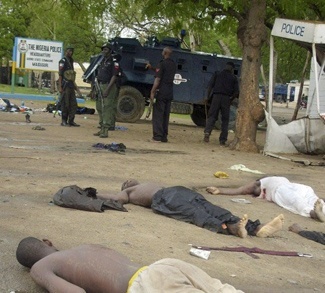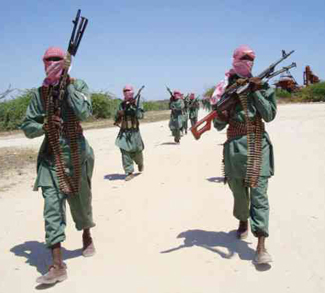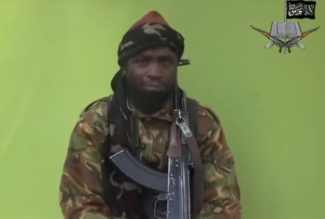FORECAST
The sudden explosion of violence in northern Nigeria doesn’t bode well for state stability moving forward, especially given the persistence of MEND’s ongoing rebellion in the south.
The ideology that underpins Boko Haram or ‘Western education is a sin’, a Nigerian militant Islamist group that launched a violent uprising in northern Nigeria, has the potential to cause widespread violence and instability in Nigeria, if only because it can easily be co-opted into wider sectarian conflicts that already exist.
There are several factors contributing to the volatility of the situation in Nigeria. Despite the boon of oil wealth, the majority of Nigerians still endure crushing poverty. Moreover, Nigerian politics is still haunted by a colonial-era division between the Muslim north and the Christian south, a separation that has fostered sectarian violence in the past. A particularly bloody example occurred in November 2008, when over 700 people were killed in the wake of a religious political feud in Jos.
Boko Haram’s guiding ideology is not specifically aimed at breaking apart the Nigerian state. Rather, it seems to resemble the Pakistan Taliban, though it is assumed to lack any real connection to international jihadist groups. However, the anti-Western disposition and stated goal of spreading Sharia law into southern Nigeria is sure to alarm Christian communities, who may in turn engage in reprisal attacks. Reports of burnt down churches in the north definitely underscore the likelihood of spiraling sectarian violence.
Further endangering the prospects for a stable Nigeria is the ongoing rebellion in the Niger Delta. An offer of amnesty and the subsequent release of MEND leader Henry Okah have both failed to stem the tide of attacks on oil companies and government infrastructure in the south. Days after Okah’s release by Nigerian authorities, MEND unleashed a new bombing campaign on Chevron and Agip facilities in the Niger Delta. MEND is certainly aware that now would be a good time to push their advantage, and in doing so maintain pressure on the central government to offer a deal that fosters a more equitable distribution of oil wealth.
The situation in Nigeria is extremely volatile. While some analysts maintain that the strength of local tradition in Nigeria acts as a shield against Islamic militancy gaining traction, it is also true that poverty, youth, and government corruption are the ingredients for countless long-festering insurgencies. Last week’s fight in the north is likely just the beginning.
SUMMARY OF EVENTS: July 27 – August 3, 2009
NORTH AMERICA
United States
The U.S. military command is considering contracting a private firm to manage security on the front lines of the war in Afghanistan, even as Defense Secretary Robert M. Gates says that the Pentagon intends to cut back on the use of private security contractors.
The top U.S. aid agency has suspended a $644 million Iraq jobs program after two outside reviews raised concerns about misspending, including an inspector general’s audit that found evidence of phantom jobs and money siphoned to insurgents.
Attorney General Eric Holder told ABC News in an exclusive interview Wednesday that he is increasingly concerned about Americans becoming radicalized and turning to terrorism.
A defense analyst who was convicted of passing sensitive information to suspected Israeli agents says he worked as an FBI “double agent” for 10 weeks before the agency turned against him and accused him of passing secrets to suspected Israeli spies.
Several financial giants that received federal bailout money in the last year paid out bonuses to employees in 2008 that greatly exceeded the amount of profit generated by the banks, according to a study on executive compensation released by New York State Attorney General Andrew Cuomo Thursday.
In a radio interview Friday, former FBI translator Sibel Edmonds said that the U.S. maintained ‘intimate relations’ with Bin Laden and the Taliban “all the way until the day of September 11.”
SOUTH AMERICA
Colombia
Colombia has seized anti-tank weapons from leftist FARC rebels that were purchased by Venezuela in Europe, Vice President Francisco Santos said Monday, as Sweden sought an explanation.
Colombia’s biggest rebel army denied on Tuesday government accusations that it gave money to the political campaign of leftist President Rafael Correa of neighboring Ecuador.
Ecuador
Documents in which a slain leader of Colombia’s FARC rebel group said he gave money to former aides of leftist Ecuadorian President Rafael Correa appear to be genuine, Ecuador’s government said on Thursday.
Venezuela
Venezuela will withdraw its ambassador from Colombia and freeze relations with its Andean neighbor, President Hugo Chavez said on Tuesday, following days of accusations over troop buildups and alleged arms supplies.
WESTERN EUROPE
Britain
Large parts of the CIA’s “extraordinary rendition” program — which sent terrorist suspects to countries and prisons where they would be tortured — could soon become public, thanks to a lawsuit in Britain on behalf of a person who claims he was a victim of the agency’s program.
Spain
The Spanish government accused the Basque separatist group ETA of trying to kill women and children on Wednesday in a car bombing outside a police barracks in northern Spain which wounded more than 60 people.
Police in the Spanish resort of Majorca have deactivated a second bomb close to the site of a blast at a police barracks that killed two officers earlier on Thursday on the island, Sky News said.
MIDDLE EAST
Iran
Iranian riot police armed with batons and belts clashed with mourners staging a defiant graveside commemoration on Thursday for protesters killed in post-election violence, witnesses said.
Iran on Friday lashed out at foreign governments, accusing them of complicity in crimes and killings in the aftermath of the disputed re-election of President Mahmoud Ahmadinejad.
Iraq
At least 150 people were wounded in clashes on Tuesday when the Iraqi army stormed the base for Iran’s main armed opposition in exile, security officials and a camp resident said.
Iraq denied on Wednesday that any Iranian exiles were killed in clashes with security forces when they seized control of their camp north of Baghdad, but residents said 11 had died and distributed images of bodies.
A wave of bombs targeting Shiite Muslim worshippers at mosques across Baghdad killed 29 people and wounded more than 136 on Friday a month after U.S. troops withdrew from Iraq’s main urban centres.
Israel
Six Israeli warplanes made their way right up to the north of Lebanon on Tuesday, in a serious violation of Lebanon’s airspace, the official National News Agency (NNA) reported.
EAST ASIA
China
Nearly 10,000 Uighurs involved in deadly riots in China’s northwestern Xinjiang region went missing in one night, exiled Uighur activist Rebiya Kadeer said Wednesday, calling for an international investigation.
North Korea
North Korea has accused the U.S. and South Korea of carrying out more than 180 spy plane missions in July amid mounting tensions over Pyongyang’s nuclear issue.
CENTRAL ASIA
Kyrgyzstan
At least 150 protestors were detained in Kyrgyzstan on Wednesday, the opposition said, as police surpressed a series of demonstrations against the disputed re-election of President Kurmanbek Bakiyev.
AFRICA
Nigeria
Nigeria’s security forces on Monday fought gun battles with radical Islamists who went on a rampage torching churches, police posts and government buildings in four northern states.
Fresh fighting broke out in Bauchi Tuesday after Nigerian forces shelled a mosque and the home of the leader of an Islamic fundamentalist sect on the third day of fierce clashes that have killed more than 250 people, witnesses said.
Human rights groups on Thursday called on Nigeria to investigate the killing of an Islamist leader shot dead in military custody after leading an uprising that caused hundreds of deaths.




